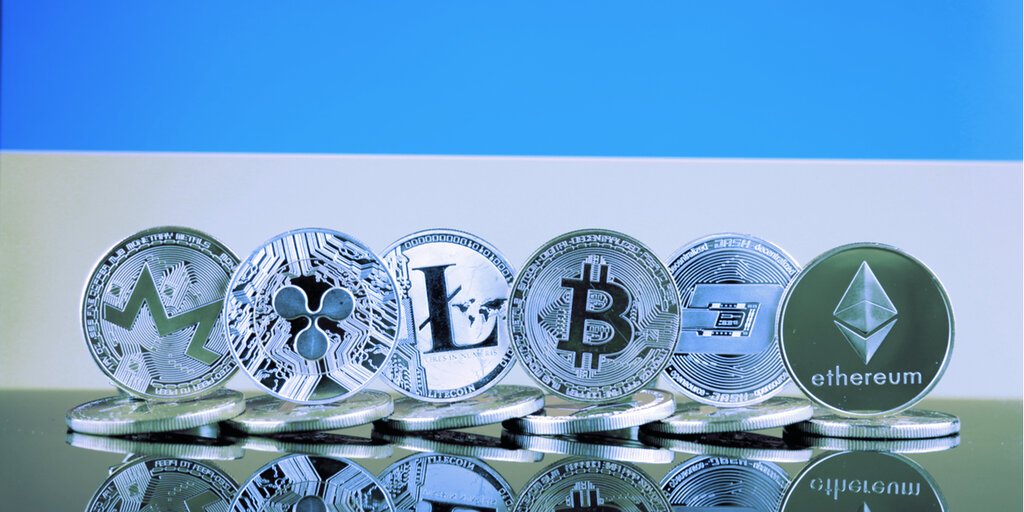Trading volume for Bitcoin and other cryptocurrencies on popular Ukrainian crypto exchange Kuna surged over 200% earlier today, according to CoinGecko.
From under $1 million on February 21, trading volumes on Kuna reached highs of $4.8 million today, the highest volume seen on the exchange since May 2021, before stabilizing around $2 million.
On Thursday, Russia launched a full-scale invasion of Ukraine, and a state of national emergency in has been declared in the country, including a ban on digital money transfers.
Kuna trading volume. Source: CoinGecko
Ukraine introduces currency controls
Tens of thousands of Ukrainians are fleeing the conflict, as Russian troops today encircled the Ukrainian capital Kyiv from the north, south, and east. The invasion could ultimately force up to five million Ukrainians to flee their homeland, according to the United Nations.
As part of its emergency measures, Ukraine’s central bank has suspended the issue of electronic money, the replenishment of electronic wallets with electronic money, and the distribution of electronic money by issuing banks. The measure is likely to affect fiat currencies held in digital accounts through platforms like Venmo or PayPal.
The Ukrainian currency, the hryvnia, this week plunged to levels not seen since 2015, when the country was on the verge of default. Ukraine’s central bank has responded by suspending the foreign exchange market, limiting cash withdrawals, and imposing a prohibition on the issuance of foreign currency from retail bank accounts.
Amid the geopolitical upheaval, many Ukrainians have turned to cryptocurrencies. “The majority of people have nothing else to choose apart from crypto,” Michael Chobanian, founder of the Kuna exchange, told CoinDesk earlier in the week, prior to Russia’s invasion of Ukraine. He added that, “We’re talking about millions of dollars of cash that wants to go into crypto.”
On crypto exchanges, Ukrainians are currently paying a premium for Tether’s USDT stablecoin, which is pegged to the price of the U.S. dollar.
Increasing demand for crypto in Ukraine has propelled the exchange rate for 1 USDT to 33 Hryvna ($1.10) at exchanges including Kuna and Binance. At Kuna, Bitcoin is currently trading at $40,820, while the CoinMarketCap rate is currently $38,565.21.
USDT/UAH chart. Source: TradingView
The USDT/UAH pair makes up the lion’s share of volume on Kuna in the last 24 hours, at 29.4% of its total trades according to CoinGecko. The USDT/RUB pair makes up 16.9% of 24-hour volume on the exchange, followed by ETH/UAH and BTC/UAH, at 14.3% and 13.5% respectively.
Despite trading at a premium against the hryvnia, USDT, the most popular stablecoin by market cap, has been less affected by the volatility experienced by cryptocurrencies such as Bitcoin and Ethereum; both leading cryptocurrencies crashed on news of the invasion, before rebounding by almost 10% in the last 24 hours.
Ukraine turns to crypto
Cryptocurrencies were already popular in Ukraine prior to the hostilities unleashed on the country.
Earlier this month, the Ukraine parliament, the Rada, ratified a law that paved the way for the central bank to issue its own digital currency. Just days before the Russian invasion, Ukraine legalized Bitcoin and other cryptocurrencies, with plans to open the cryptocurrency market to businesses and investors.
Following the invasion, Ukrainian organizations have turned to cryptocurrency for funding; the NGO Come Back Alive, which has been suspended from Patreon for “funding military activity,” raised over $400,000 in Bitcoin in a single day. Meanwhile, political activist and Pussy Riot member Nadya Tolokonnikova has launched a decentralized autonomous organization, UkraineDAO, to raise funds to donate to Ukrainian civilian organizations.
https://decrypt.co/93827/crypto-exchange-volumes-in-ukraine-spike-as-currency-controls-introduced
The top 5 crypto news stories & features in your inbox each day.
Get Daily Digest for the best of Decrypt. News, original features and more.
Source: https://decrypt.co/93827/crypto-exchange-volumes-in-ukraine-spike-as-currency-controls-introduced




